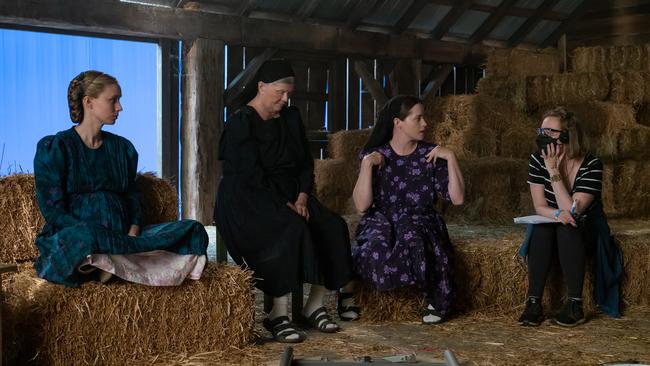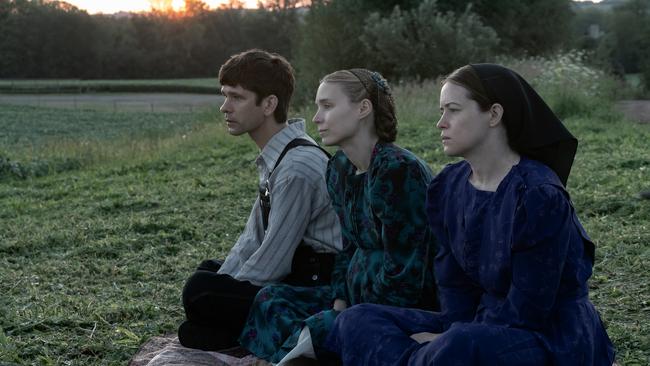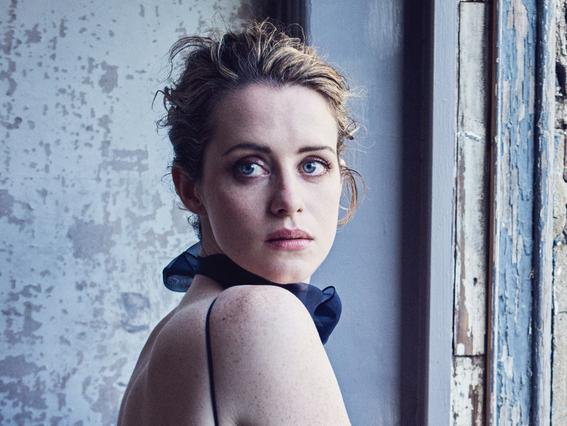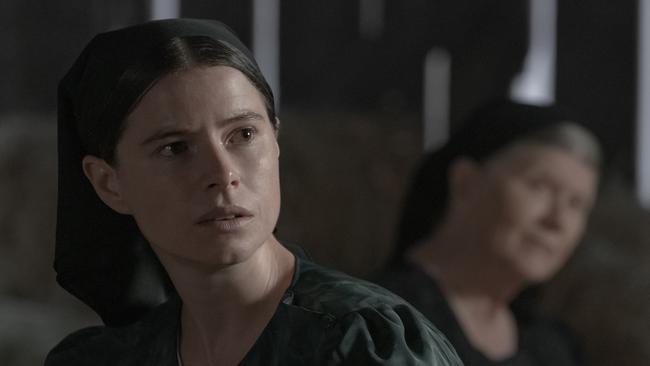Women Talking: ‘Men have made the rules of film. We’re rewriting them’
Claire Foy on trauma, anger and the movie every woman (and man) should see.

There are two sisters. Their names are Ona and Salome. They are from a Mennonite colony; they were born into it, their faith is the guiding principle of their life. And over the course of the film Women Talking, directed by Sarah Polley and adapted from the award-winning 2018 Miriam Toews novel of the same name, they will come to question everything they have known. Because these women and many more – the cast includes Jessie Buckley and Frances McDormand, who is also a producer and secured the rights to the book – have suffered prolonged sexual abuse from the men in their community.
They are faced with a dilemma: should they do nothing? Stay and fight? Or should they – can they – leave?
Ona, played by Rooney Mara, is a philosophising optimist despite the violence that she has endured; her sister Salome, whose own daughter is also one of the many victims, is fierce and ferocious, in a powerhouse performance from Claire Foy, best known for playing Queen Elizabeth II in seasons 1 and 2 of The Crown. Both seem born for their roles: Mara, the winsome dreamer – “a bright light in this very dark space,” as Mara puts it to Review – and Foy the mother wolf. But the reality is that Foy initially met with Polley for the part of Ona.
“Based on her previous work, that was the obvious role for her,” director Polley tells Review. “But through the course of the conversation, I remember saying to Claire, ‘I think you might be more of a Salome.’” (Foy remembers “this Zoom where we basically talked about everything in life. We talked a lot about Brene Brown.”) Polley identified a steeliness to Foy perfect for the film’s voice of righteous fury. “She’s uncompromising with the truth,” Polley affirms. “She’s always the person who will say the thing that everyone is too frightened to say, but which really should be said.”
Mara, on the other hand, was meeting with Polley about the film without any discernible role in sight. “Rooney was the first person I met, but it was before I started writing,” Polley says. “She just really loved the book.”
They first met when Mara was in Toronto working on a film with her then eight-week-old son River, born in 2020 with partner Joaquin Phoenix. “My baby was very, very tiny,” Mara recalls. It was in the early days of the pandemic; “we sat outside in our big puffy jackets and I would go inside periodically to breastfeed,” Mara recalls. “It was obviously incredible to talk to her about the book, but also just to get to talk to her about being a mum. She gave me such incredible advice that really kind of changed my life, actually.” What was it? “It’s gonna sound so stupid to you,” Mara says, laughing. “He was sleeping in the bed with me, and I was still getting up to change his diaper like three times a night … And she was like, ‘You don’t need to do that. Unless it’s waking him up, don’t get up to change the diaper’ … We both got to sleep more.”
After an extensive casting process during which Polley still had not found her Ona, the filmmaker reflected on Mara once more. “I think she’s the hardest part to play,” Polley explains. “She says things that are so idealistic and philosophical and it’s so easy for that to be annoying. It required someone who really believes those things and I think that Rooney believes most of the words that Ona says. I think it’s how she lives, too. It required that very deep connection with someone as wise and compassionate and intuitive as Rooney. I don’t think anyone else could have done it, actually.”
Women Talking is essentially a debate: nine women and one male record-keeper, played by Ben Whishaw – the women cannot read or write – gather in a hayloft for two days to decide their future. “The women have the ability to talk about really big issues, but communicating in the way that I navigate my life, in a way that women talk to each other,” Foy says.
The film is structured around these conversations. Opinions change and allegiances shift as the clock counts down, and yet the conclusion is never foregone. Any of the options being mooted – staying and fighting, doing nothing, or leaving – has potential to come to pass. This tension lends real gravitas to the monologues that comprise the spine of the story, as each of the women voice their concerns. Foy’s Salome has two of these blistering speeches that she performed 120 times on set, Polley recalls, each of them rippled through with fury. No wonder the cast has been nominated for Best Ensemble at the Screen Actors Guild Awards and Best Picture and Best Adapted Screenplay at the Oscars.

Anger is at the heart of the film: anger at what these women have been subjected to and at the task that still lies ahead of them. “Anger, I think as women, a lot of the time is labelled as dangerous or emotional or erratic or, you know, crazy,” Foy says. “But I think Salome is completely right … Something absolutely horrific has happened and someone needs to fight for it and stand up for the women.” But it’s not the only emotion held by these characters. “There are many different responses to trauma,” explains Polley. “And they’re all legitimate. Some of them have to do with collapsing in a heap on the floor and some of them have to do with trying to find a way towards healing and some of them have to do with fury, and those are all reasonable responses to the same thing.”
Polley engaged a psychologist, Dr Lori Haskell, to consult with cast and crew on how trauma impacts the brain.
“She was also there for us as a container on set, in terms of the experiences it brought up,” Polley shares, “because there were a lot of crew who were survivors.” Polley didn’t hesitate to pause production if the subject matter became overwhelming. “People’s wellbeing and experience was definitely the priority on the film, not the product of the film itself,” the director explains. “And the idea was that’ll make a better film if we do that.”

Foy raves about Polley’s approach. “The set wasn’t all sunshine and rainbows,” the actor clarifies, “when I say it was unique and amazing, it wasn’t because it was easy.” But there was a sense of camaraderie between the cast and crew forged out of real respect for the material and each other.
“There was a lot to get into and we all had to be quite brave, everybody,” Foy shares, a tone set from the beginning by Polley. “She is like no other director I’ve ever worked with,” Foy enthuses. “She is the most generous, open, honest leader of anything I’ve ever experienced. She apologises. She says when she doesn’t know the answer. She asks difficult questions. She asks you, going ‘I don’t know what the answer is’. She’s there to learn as much as you are. I really think everyone on Sarah Polley’s set feels valued.”
Foy points to moments where crew members shared ideas for how a scene could unfold and Polley implemented their suggestions immediately. “Who does that? No one. Like, no one I’ve ever worked with, ever,” Foy declares. Or when Canadian actor Sheila McCarthy, who stars as community member Greta, asked if she could make a small but impactful change to the background of a key flashback scene after production wrapped.

“A lot of people don’t take that time and care, and they also think that actors are there to be puppets to their mission of what their film is going to be, but Sarah is like, there is no film unless everyone is involved in it and listening to each other,” Foy continues. “I really do think she should run the world.”
Key to Polley’s vision for Women Talking was instigating a 10-hour workday, something that is practically unheard of on a film set. The filmmaker began her career as a child actor, and has recounted her “terror” on the set of Terry Gilliam’s The Adventures of Baron Munchausen as an eight-year-old, which she described in her 2022 memoir Running Towards The Danger as “unsafe”, in part due to unregulated stunts. Of her acting years, Polley remembers long days, sometimes stretching to 18 hours, being an expected part of the job, something she says now is “just dangerous”. “And beyond dangerous, it requires families to be bereft of parents,” Polley adds. “It’s just an ugly thing, it’s really unnecessary. It costs more money to have more days and shorter hours, but it should be what’s expected.”
Polley made her first film, the Oscar-nominated Away From Her starring Julie Christie, in 2006, followed by 2011’s Take This Waltz and around that time she had three children. “I didn’t see a way that I could be a filmmaker and have any kind of connection with my kids based on what I had seen of the filmmakers who went before me,” Polley explains. “I had put in the back of my mind that maybe I wouldn’t make another film until my kids were a lot older.” Initially hired only to write the script for Women Talking, Polley told producer Frances McDormand that she would love to direct – but that she couldn’t imagine how to make it work without a shorter day. “This battle cry went up from Fran,” Polley recalls. “She says, ‘This is called Women Talking, and men have made the rules of film. We’re rewriting them.’ ”
Polley sees this as the beginning of a “new model of working” for female filmmakers. “I have met at least a dozen filmmakers who have self-selected out of the business because they have kids,” Polley explains. “I can either be a parent, or I can be a filmmaker but I absolutely can’t do both. And not like that regular work/life juggle – like I can’t do both well – you literally cannot be a present parent and work a regular film shoot day for six or seven months.”
This kind of change is not merely for the benefit of filmmakers, but for all women on set. “You’re used to working 12 to 16 hours a day on film, but you can’t do that as a mother,” Mara explains. “You would never see your child … Sarah made it seem like, oh, it’s possible.”
Women Talking is now the example she will hold up when deciding on what kind of work, and what kind of film sets, she wants to spend time on in the future. “I have the privilege to be present and I want to be present and I don’t want to miss this time with him, but I do still want to fulfil myself creatively,” Mara muses. “I don’t plan on working unless it’s something that I feel I have to do. Unless it’s something (where) my son will be able to be there. The bar is really high now. And also, the standard for what the experience of what work will be like is also really high now. Because it’s not just me anymore. I have to think about someone else as well.”
Women Talking is in cinemas on February 16.


To join the conversation, please log in. Don't have an account? Register
Join the conversation, you are commenting as Logout